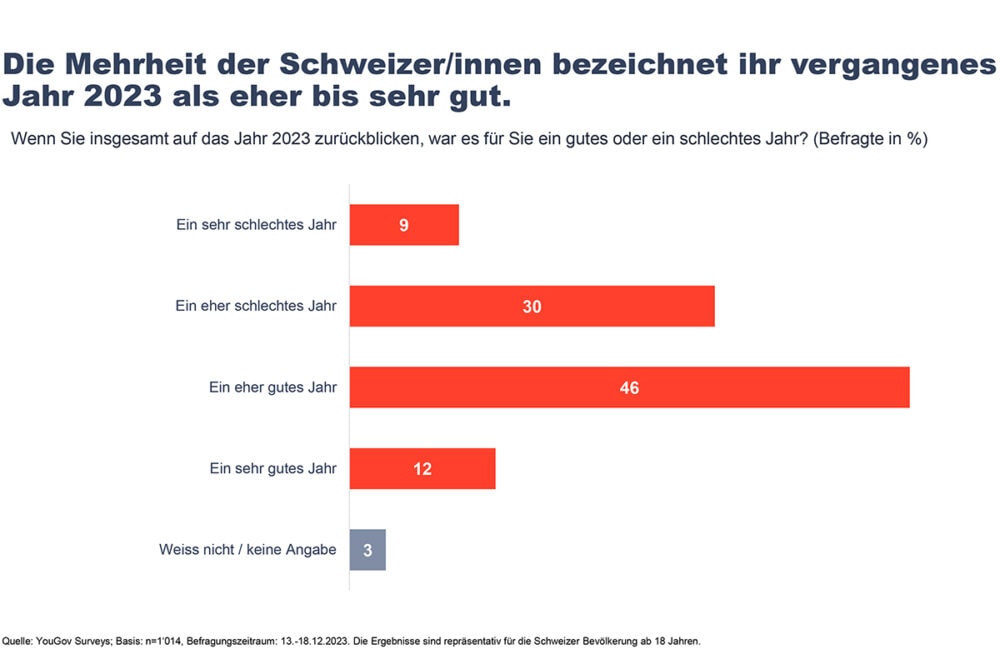Swiss economy with solid growth in 2022
Although the Swiss economy stagnated in the fourth quarter, it achieved solid growth in 2022 as a whole despite a challenging international environment with war, inflation and high energy prices.

Following a 0.2 percent increase in the third quarter, the growth rate of real gross domestic product (GDP) flattened to 0.0 percent in the period from October to December, the State Secretariat for Economic Affairs (Seco) announced on Tuesday. This previous quarter's figure was slightly below estimates: Economists surveyed by AWP had expected GDP growth of between +0.1 to +0.3 percent.
However, things look relatively good for 2022 as a whole. According to initial estimates by Seco, GDP growth was 2.1%. This clearly prevented the recession still expected after the start of the war, even if growth was halved compared with 2021 (+4.2%).
However, the year was somewhat divided. While economic development in the first half of the year and especially in the first quarter was still characterized by the ongoing recovery from the Corona crisis, the Russian war of aggression on Ukraine and the tense energy situation in Europe weighed on further development.
This is impressively demonstrated by the GDP figures compared with the corresponding period of the previous year: GDP grew by 4.4 percent in the first quarter, for example, but then by only 2.4 percent in the second quarter and by 0.8 percent in each of the third and fourth quarters. Industry, for example, already showed a negative trend from the second quarter onwards.
Hospitality industry still lagging behind
Corona catch-up effects were still seen above all in the hospitality industry: value added in this sector rose by 52.4 percent. However, the arts, entertainment and recreation sector (+23.7%) and the transport and communications sector (+6.8%) also still grew relatively strongly. Overall, according to Seco, around 1.3 percentage points of GDP growth in 2022 is attributable to these three sectors. It is interesting to note, however, that the pre-crisis level of value added has not yet been reached again in either the hospitality or entertainment sectors.
In principle, however, no further major Corona catch-up effects are to be expected, Eric Scheidegger, head of the Economic Policy Directorate, said at a video conference. This can also be seen from the fact that the level of Swiss GDP is currently 2.7 percent above the level of the fourth quarter of 2019 - i.e. the last quarter before Corona - again.
In an international comparison, Switzerland has thus recovered very well. Only in the USA is the figure significantly higher, at +5.1 percent. Some countries, such as Spain and the UK, are still below the pre-Corona level.
Turning point reached?
Despite the stagnation in the last quarter, Seco is reasonably optimistic about the further course of the economy. Sentiment indicators, for example, have recently stabilized after a sharp decline and could indicate that the economy has reached the turning point towards more growth, said Scheidegger.
The indicator for economic activity in Switzerland, which is calculated weekly by Seco, is also currently showing year-on-year growth of 1.3 percent. And the purchasing managers' indices in most other countries are also above 50 points and therefore point to growth.
The main reason for this is certainly that there has not been an energy shortage this winter, as had been feared. According to Seco officials, there is unlikely to be a supply crisis. The mild winter so far has certainly contributed to this. Although a scenario similar to that which has now failed to materialize for this winter is also looming next winter. "From today's perspective, however, I would rule out a recession for this year," Scheidegger said. (sda)








